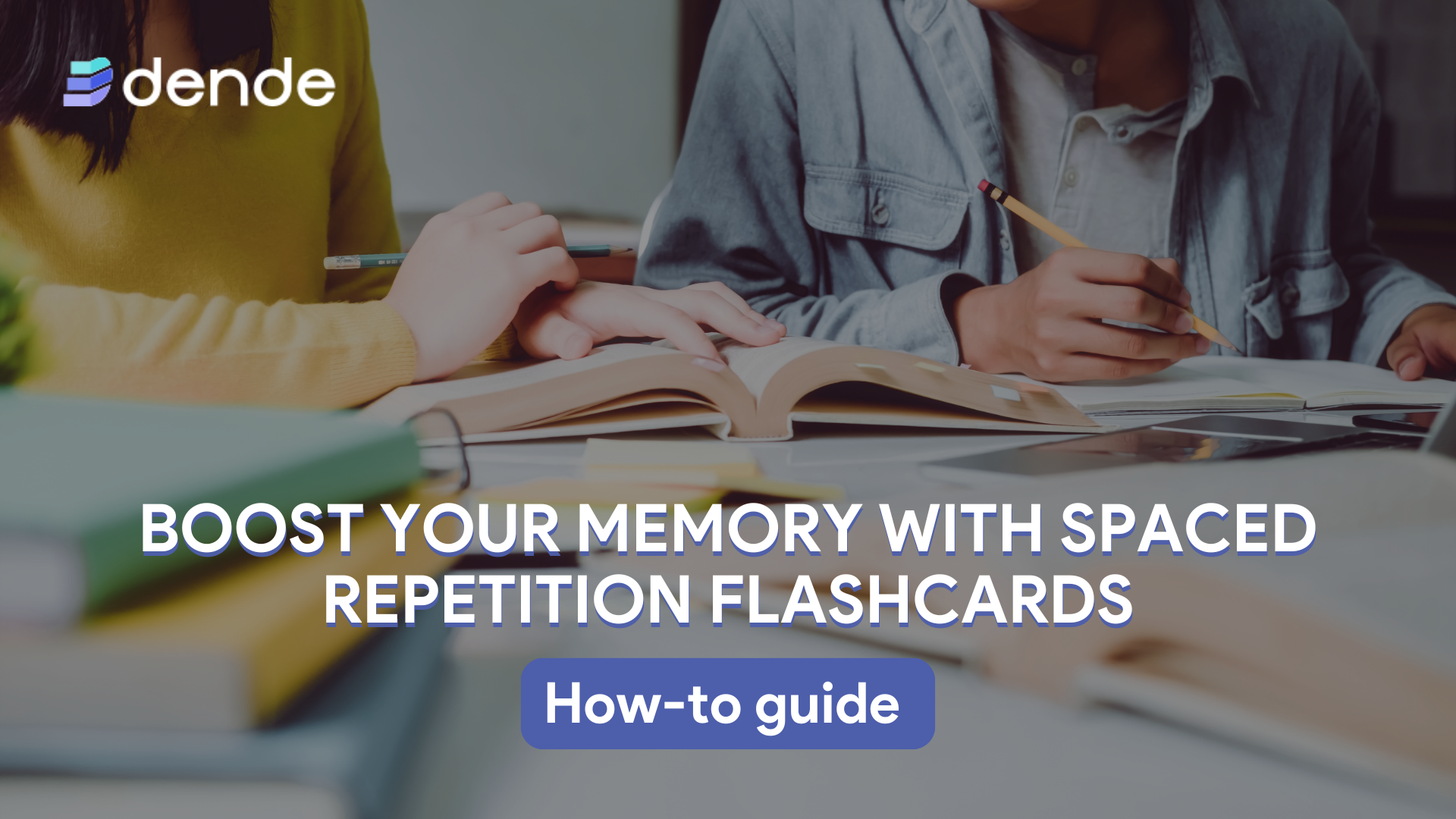
Share with your student friends
ShareGet ready for your next exam
Start for freeStudying isn’t just about understanding — it’s about remembering. You can read your notes ten times and still blank out during the exam. Sound familiar?
That’s because our brains aren’t designed to store everything we read in one go. Information fades fast unless we do something specific to make it stick. The key isn’t reading harder or for longer — it’s studying smarter.
One of the most effective ways to boost memory retention is spaced repetition. It’s a technique backed by science, trusted by top students, and built right into Dende’s flashcard system. Whether you’re preparing for a big exam or trying to master complex terms in medicine, law, or engineering, this study method can help you retain more in less time.
In this guide, I’ll explain how spaced repetition flashcards work and how you can start using it on Dende today.
Contents
What is spaced repetition and why it works
Spaced repetition is a learning technique that involves reviewing information at increasing intervals over time. Instead of cramming everything in one session, you review the same material multiple times — just when you’re about to forget it.
This concept is based on something called the forgetting curve, discovered by psychologist Hermann Ebbinghaus. He found that memory fades quickly after learning something new — unless we interrupt that forgetting process by reviewing the material. The ideal moment to review is right before you forget — not too soon, not too late.
Each time you recall the information successfully, your brain strengthens the memory and slows down the rate at which you forget it. This means you can remember more with fewer total reviews — and spend less time re-learning things you thought you already knew.
The magic of spaced repetition is in the timing:
- Review too early, and you waste time.
- Review too late, and you’ve already forgotten.
- Review at the right time, and you build long-term memory efficiently.
That’s why it works so well for subjects that require a lot of memorization, like anatomy, pharmacology, dates in history, or legal definitions.
Why flashcards + spaced repetition are a perfect match
Flashcards are a natural fit for spaced repetition. They’re short, focused, and force you to actively recall the answer — which is way more effective than passively rereading notes.
When you use flashcards, you engage in active recall. That means you try to bring up the answer from memory before flipping the card — which is one of the most powerful ways to strengthen neural connections.
Now, combine that with spaced repetition, and you’ve got a study method that works like this:
- You review flashcards daily.
- Cards you answer correctly come back later.
- Cards you struggle with reappear sooner.
- The schedule adapts to your memory — automatically.
Dende makes this process even smoother. You can generate flashcards directly from your own notes or textbooks and Dende will organize them into smart review sessions based on how well you know each card. No need to manually track when to review each one — Dende handles that for you.
Unlike traditional flashcards, which you might shuffle randomly, Dende’s smart flashcards are ordered by priority. This means you’re always spending your study time on the concepts that need the most attention, instead of repeating what you already know.
Flashcards + spaced repetition =
- Less forgetting
- More efficient sessions
- Long-term mastery without burnout
In the next section, we’ll walk you through how to actually use spaced repetition flashcards on Dende — step by step.
How to use spaced repetition flashcards on Dende
Getting started with spaced repetition on Dende is fast and effortless — no need to download anything or create cards from scratch.
Here’s how you can use flashcards with spaced repetition in just a few steps:
1. Upload your study material
Start by uploading your material (.pdf, .doc, .ppt .txt). Whether it’s a textbook chapter or your lecture summary, Dende can work with it.
2. Generate flashcards automatically
Click on “Flashcards,” and Dende’s AI will generate question-answer pairs from your content.
3. Start your first review session
Once your flashcards are ready, Dende will schedule them based on a spaced repetition algorithm. During your study session, you’ll be asked to rate how well you remembered each answer (“Learning”, “Got it”, “Very easy”), and Dende will use that feedback to decide when to show the card again.
4. Let Dende do the timing
You don’t need to worry about keeping track of review dates — Dende’s smart system will handle that. Each day, your dashboard will show exactly which flashcards you need to review and how urgent they are.
The more consistently you use the system, the better it works. Just 15–20 minutes a day can make a huge difference.
Tips to get the most out of your flashcard sessions
To really make spaced repetition work for you, a bit of strategy helps. Here are a few simple but powerful tips:
- Be honest with your ratings
When you finish a flashcard, don’t rush to mark it as “Very Easy” just to move on. If something felt shaky, tell the system. That way, it can help you more effectively. - Be consistent
Spaced repetition works best when you show up regularly. A short daily session (10–20 minutes) is far more effective than one long weekly review. Dende tells you exactly what to review each day — trust the process. - Don’t just guess — recall actively
Before flipping a card, really try to recall the answer. That mental effort is what strengthens your memory. Even if you’re unsure, thinking it through helps your brain make stronger connections.
How a med student reviews anatomy with spaced repetition
Let’s say you’re studying anatomy and you have a chapter full of detailed notes. Here’s how a med student might use Dende to master the topic:
- Step 1: They upload their anatomy notes into Dende.
- Step 2: Dende generates flashcards like:
- “What is the origin and insertion of the flexor carpi ulnaris?”
- “Which nerve innervates the extensor digitorum?”
- “Name the superficial muscles of the anterior forearm.”
- Step 3: They review these cards every day, rating each one based on recall difficulty. Cards about origins and insertions, which are harder to memorize, come up more often. Easier cards — like nerve supply — show up less frequently over time.
- Step 4: After a week, Dende shows fewer new cards and more focused reviews. By exam time, they’ve seen every card multiple times, exactly when their brain needed the reminder.
The result? Instead of cramming everything the night before, they walk into the exam with a solid, well-spaced foundation.
Conclusion
Spaced repetition isn’t just a buzzword — it’s one of the most powerful study techniques out there. And when you pair it with flashcards, you get a system that actually respects how your brain works.
With Dende, you don’t have to build that system from scratch. You can generate flashcards from your own notes in seconds, follow a smart review plan, and make real progress every day — without burning out or forgetting what you studied last week.
Whether you’re tackling anatomy, case law, or engineering concepts, spaced repetition flashcards can help you remember more in less time.
Ready to give it a try? Open Dende, upload your notes, and let the smart repetition begin.
